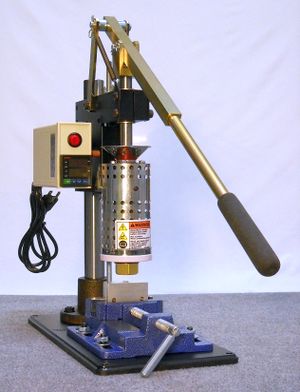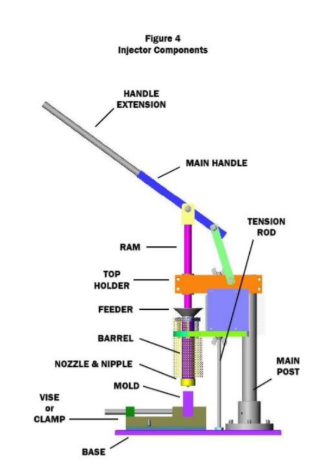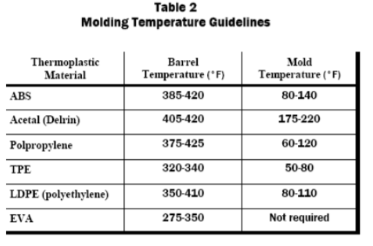Difference between revisions of "Injection Molding Machine"
| Line 30: | Line 30: | ||
==Description== | ==Description== | ||
| − | The Model 150A PIM-SHOOTER™ by LNS Technologies is a bench model injection molder designed for production of thermoplastic parts in quantities required for making prototypes and low-volume production (or higher-volume production of small parts). Due to the machine’s small size it is limited to producing small parts, but it is capable of producing these parts efficiently, accurately (as accurate as the mold is), and repeatedly. | + | The Model 150A PIM-SHOOTER™ by LNS Technologies is a bench model injection molder designed for production of thermoplastic parts in quantities required for making prototypes and low-volume production (or higher-volume production of small parts). Due to the machine’s small size it is limited to producing small parts, but it is capable of producing these parts efficiently, accurately (as accurate as the mold is), and repeatedly. The plastic shot size is 1.1 cubic inch Max. |
{{#evu:https://www.youtube.com/watch?v=5_UnthpIA0w&feature=youtu.be}} | {{#evu:https://www.youtube.com/watch?v=5_UnthpIA0w&feature=youtu.be}} | ||
Revision as of 16:15, 1 July 2020
Make: Pim-shooter
Model: 150A
Ace: Sam Manina (smanina22@georgefox.edu).
Location: The Vault
Description
The Model 150A PIM-SHOOTER™ by LNS Technologies is a bench model injection molder designed for production of thermoplastic parts in quantities required for making prototypes and low-volume production (or higher-volume production of small parts). Due to the machine’s small size it is limited to producing small parts, but it is capable of producing these parts efficiently, accurately (as accurate as the mold is), and repeatedly. The plastic shot size is 1.1 cubic inch Max.
Documentation
Terminology
Flash - This is when the two halves of a molding tool are not properly sealed, causing molten plastic to leak out of the part cavity
Sprue - The main channel guiding the molten plastic from the nozzle of the injection molder into the part cavity.
Runners - Subchannels that branch off from the sprue and into the part cavities. These are used for mold tools that contain multiple part cavities.
Gate - The thin section connecting a runner or sprue to the part cavity
User Manual
Training
Overview
The injection molder works by melting plastic pellets within a heated barrel to a specific temperature, and using a ram plunger to force the molten plastic through a nozzle, into a mold cavity.
Demonstration
For the injection molder demonstration, a pre-existing mold will be provided and the person must successfully injection mold the part. They should demonstrate proper adjustment of height to fit the mold, setting up for injection (filling the hopper, setting the temperature, and aligning the mold under the nozzle), injecting, and removal of the mold and part from the mold.
General Procedure
- Setup
- First we have to Preheat the mold. If a hot plate is available, preheat the aluminum mold to prevent plastic cooling too fast by placing the mold on the hot plate and heating to a specific temperature. Temperatures for different plastics can be found in the table below.
- Next we need to adjust the height by following these steps.
- Set the mold clamps to measure the gap.
- Loosen the height adjustment bolts on the top holder using a 6mm Allen Wrench.
- Loosen both tension nuts, and turn the lower tension nut to move the top holder up and down the main post. This will determine the height of the machine.
- Raise or lower the top holder so that there is a gap between the nozzle and the mold (this allows adding and removing the mold), but of no more than ½”.
- Tighten height adjustment bolts, and verify that the nozzle aligns well with the mold sprue.
- Tighten the upper and lower tension nuts.
- Molding
- Now we can starting molding materials!
- First we need to set the temperature for the mold.
Safety
Parts of the injection molding machine get very hot and could burn you. You need to wear gloves while working with the machine and molds.
Certification
Troubleshooting
It may take some time to learn how much pressure to apply to the handle when filling a mold. If you press too hard you will end up with lots of plastic flash on your finished piece as material will ooze out between the mold halves. If you don't press hard enough you could end up with an air pocket left in the mold.
If you run into an issue with the material not flowing properly make sure that you are heating the material to the correct temperature and allowing enough time for the plastic to melt.
Maintenance
General maintenance
The machine should to be cleaned on a regular basis and mechanical parts should be checked for wear as well as loosening of any parts.
Specific Maintenance Tasks
| Maintenance Procedure | Frequency | Done By |
|---|---|---|
| Clean up plastic overflow | When used | Student |



